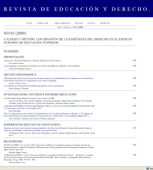Teaching without Lecturing: Law at the University Level The coaching method applied in the teaching of law to students pursuing non-law degrees.
Article Sidebar

Main Article Content
Ricardo Oliva León
Universidad de Zaragoza.
Understanding of complex legal concepts by students who do not study a Law Degree is facilitated in a learning environment where the professor provides experience and provokes thought. The results obtained from an experience in teaching innovation with students in the second year of the Degree in Tourism at the University of Zaragoza, during the academic year
2011-2012, in the class Commercial and Labor Tourism Law, corroborate the above statement. Students learn only by thinking for themselves, and a way to help is causing them to reason about constructive experiences so that from their own reflection on them they identify relationships and contradictions, and then determine their meaning. Students who do not
study a Law Degree usually do not have the same level of interest and motivation as the students who are at the Faculty of Law studying a Law Degree. The coaching method provides the university professor with the tools to provide better teaching. One tool is formulating challenging or destabilizing questions that encourage student reflection and exploration of areas previously unfamiliar to students with the aim of generating deep insight in a pleasant and collaborative learning environment.
2011-2012, in the class Commercial and Labor Tourism Law, corroborate the above statement. Students learn only by thinking for themselves, and a way to help is causing them to reason about constructive experiences so that from their own reflection on them they identify relationships and contradictions, and then determine their meaning. Students who do not
study a Law Degree usually do not have the same level of interest and motivation as the students who are at the Faculty of Law studying a Law Degree. The coaching method provides the university professor with the tools to provide better teaching. One tool is formulating challenging or destabilizing questions that encourage student reflection and exploration of areas previously unfamiliar to students with the aim of generating deep insight in a pleasant and collaborative learning environment.
Keywords
Coaching. Learning law. Teaching law. Socratic dialogue. Legal language. Legal concepts. Degree in Tourism.
Article Details
How to Cite
Oliva León, Ricardo. “Teaching without Lecturing: Law at the University Level The coaching method applied in the teaching of law to students pursuing non-law degrees”. Revista de educación y derecho, no. 10, https://raco.cat/index.php/RED/article/view/281903.
Rights
Copyright
Authors retain copyright and grant the journal the right of first publication.
Texts will be published under a Creative Commons Attribution License that allows others to share the work, provided they include an acknowledgement of the work’s authorship, its initial publication in this journal and the terms of the license.
Author Biography